3Qs: Censorship’s impact on Chinese culture

China’s Ministry of Culture recently mandated removing 100 songs from websites across the country in an effort to preserve China’s “national cultural security.” The list consists largely of tracks by Hong Kong and Taiwanese artists, but also includes hits from American pop icons such as Lady Gaga, Beyoncé and the Backstreet Boys. The ministry claims the banned songs weren’t submitted for mandatory government screening and haven’t been approved for distribution. We asked Hua Dong, a faculty member in Northeastern’s Asian Studies Program and an expert on Chinese pop culture, to analyze government censorship and its impact on Chinese culture.
Why does the Chinese government believe that music from certain American pop stars poses a threat to China’s national cultural security?
This example demonstrates another attempt by the Chinese government to rein in the fast growing Internet in the country. China now has almost 500 million Internet users, mostly young, educated and wealthy, who spend the majority of their online time using social networking sites and micro-blogging. Internet is central to the lives of China’s Netizens. It is an important venue for accessing entertainment and information, and it is an effective tool for social activism. One recent example is a protest last month attended by 12,000 micro-bloggers that successfully forced the local government to shut down a toxic chemical factory in Dalian, a Chinese coastal city. The takeaway message from the event for the Chinese web censors might be that information must be controlled and the Internet should be cleansed of any “poor taste and vulgar content.” China’s Cultural Ministry may find the rebellious and defiant nature of pop songs threatening to the “social harmony” that the government is trying to promote.
More generally, how do bans like this affect Chinese culture, media consumption and the country’s youth?
When I first learned of the Cultural Ministry’s “blacklist,” I reached out to a few friends in China who are either active in China’s culture scenes or serve as cultural officials themselves. Interestingly, none of them were even aware of the new regulation. They continue to use Weibo (a Chinese version of Twitter) and check Renren (a Chinese version of Facebook) as before. I then checked some Chinese websites, and found a growing cynicism filling the blogs. Bans like this are not enough to silence people into compliance in the 21st century.
Ai Weiwei, a Chinese artist, also recently made headlines again for his scathing attack on the government in Newsweek since being released from detention. What has the public reaction in China historically been to those such as Mr. Ai who criticize the government and censorship?
Ai Weiwei, who has nearly a hundred thousand followers on his new Twitter service since his release, has achieved huge name recognition in China. His release was met with warm welcome and support from the Netizens in China. However, this support and awareness is still considerably small within the large Chinese population. Outside the small circle of Chinese intellectuals, the Chinese public cares about the same things as any typical American — buying a car and a house, job security, affordable medical care, better schools for their children and so on. Many bloggers are not interested in promoting political change, yet remain passionate about having the right to express their opinions about topics that interest them. The government’s prosecution of dissidents tends to fall off the radar for those who mainly endeavor for a better life in a fast-evolving society.





